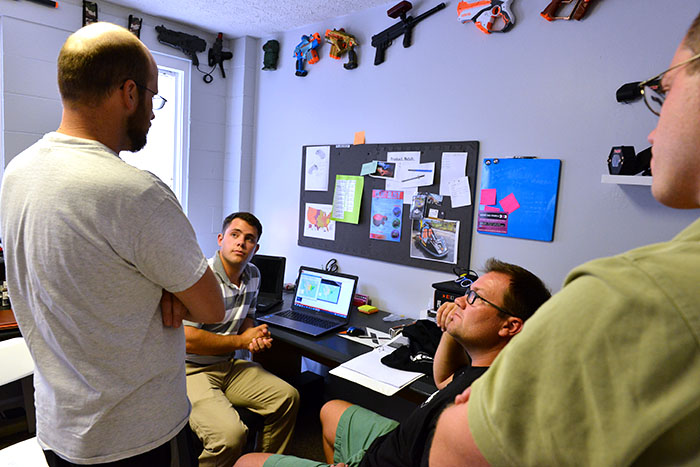Cadet Takes AIM on Laser Tag

Cadet Joe Bobay ’17 is solving quantitative logistics problems for Laser Tag Source, an online laster tag rental company, as part of the Applied and Industrial Mathematics program at VMI this summer. VMI Photos by Kelly Nye
Some people love math. They enjoy reading a complicated word problem, applying the numbers to it, and solving it.
Cadet Joe Bobay ’17 is one of those people. The trick is finding problems that need solving.
That’s why VMI’s Applied and Industrial Mathematics program was a sure fit for Bobay. The AIM programs pairs cadets with businesses that have a problem and gives the cadets five weeks to use their math skills to find a solution.
Laser Tag Source of Lynchburg rents laser tag equipment to companies in all 50 states. On the East Coast, the rentals are en route for only two days. West Coast rentals, though, are a whole different story, often tying up equipment for weeks rather than days. But owner Mike Kirby thought the company was years away from opening a second location in the West – that is, until Bobay presented his findings.
The journey to that presentation turned out to be very different from the textbook problems Bobay has solved for his classes.
“Very often it’s a far more vague problem than students are used to; that’s a big thing that's really good about this program – it’s not ‘do this integral,’” explained Maj. John David, assistant professor of applied mathematics and AIM coordinator. “In a real job no one is ever going to ask you to compute this covariance matrix or calculate this integral; they’re going to ask you something that probably has a lot of math in it but they don’t know it has a lot of math.”
In the Laser Tag problem, Bobay found he had to consider time as well as geography. Laser tag equipment is heavy and bulky, and the only way it can be shipped is by ground service.
“I just want to be able to present them with some data that says if you open a second location, this is how much you’ll be saving on shipping, this is how much of an increase you’ll have on product availability, then be able to tell them whether … it is cost-effective to open a new place or not. Maybe they need to wait longer; maybe they need to not do it at all.”
Coming to that conclusion is a tremendous learning experience for Bobay.
“Their worry stops when they sign up. Joe’s worry starts when the project begins,” said Maj. Ben Grannan, assistant professor of economics and business and Bobay’s academic adviser on the project.
As lead pastor of Lynchburg Church of God, Kirby started Laser Tag Source almost by accident. He had bought some laser tag equipment for a youth event; to make his money back afterward, he rented out the equipment, discovering a demand that inspired him to launch a website. Three years later he found himself on the cusp of a coast-to-coast business.
“Basically we could open another location today,” said Kirby, ready to explore Bobay’s suggestion. “Joe exceeded our exceptions, and I was very impressed with his work. We were shocked to find out how much we could save by opening a second location.
Getting a solution to a problem is only part of the point for some participating companies. Many businesses, said David, appreciate being able to provide a learning opportunity in addition to paying less for an expensive service in the professional world.
“The program is like an academically oriented consulting firm,” David explained. Twenty-one cadets have participated as of June 2015, with some of those experiences leading to job offers.
“I would highly recommend this [AIM] program to any business owner who deals with large amounts of data – sales, marketing, shipping, etc.,” added Kirby. “I am more than pleased with this project.”
Businesses interested in participating in the AIM program should visit www.vmi.edu/aim.
– Kelly Nye
.svg)
.png)